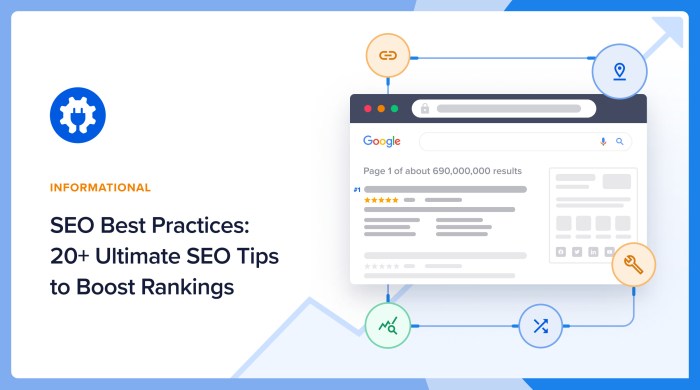SEO Best Practices – Best Practices set the foundation for maximizing your website’s visibility and driving organic traffic. From on-page optimization to technical , explore the key elements that can elevate your online presence.
Importance of Best Practices

Following best practices is crucial for website visibility in the vast online landscape. By optimizing your website according to these practices, you increase the chances of your site being found by search engines and, ultimately, by potential customers.
Impact on Search Engine Rankings
Implementing best practices can significantly impact your search engine rankings. Search engines like Google use various algorithms to determine the relevance and authority of websites. By adhering to best practices such as using relevant s, creating high-quality content, and optimizing meta tags, you can improve your website’s visibility and climb higher in search engine results pages.
Benefits for Online Businesses
For online businesses, implementing best practices can lead to increased organic traffic, higher conversion rates, and ultimately, more revenue. By appearing higher in search results, you can attract more potential customers who are actively searching for products or services like yours. Additionally, optimizing your website can improve user experience, leading to higher engagement and customer satisfaction.
On-Page Optimization

Yo, when it comes to On-Page Optimization for , it’s all about making sure your website is on point for those search engines to find you easily. Let’s dive into the key elements and strategies to boost that visibility!
On-Page Optimization is all about tweaking your website’s content, structure, and HTML elements to improve search engine rankings. This includes optimizing s, meta tags, headers, and images to make your site more attractive to search engine crawlers.
Key Elements of On-Page Optimization, SEO Best Practices
- Optimization: Using relevant s throughout your content to improve search engine visibility.
- Meta Tags: Crafting compelling meta titles and descriptions to entice users to click on your site in search results.
- Header Tags: Utilizing H1, H2, and H3 tags to organize content and highlight important s.
- Image Optimization: Adding descriptive alt text and file names to images for better visibility in image searches.
On-Page Optimization Strategies
- Creating High-Quality Content: Publishing informative and engaging content that resonates with your target audience.
- Mobile Optimization: Ensuring your website is responsive and mobile-friendly for users on smartphones and tablets.
- Internal Linking: Linking to relevant pages within your site to improve navigation and boost .
- Page Speed Optimization: Optimizing loading times to enhance user experience and search engine rankings.
Contribution to Search Engine Visibility
On-Page Optimization plays a crucial role in improving your website’s search engine visibility by making it easier for search engines to understand and index your content. By implementing these strategies effectively, you can increase your chances of ranking higher in search results and driving organic traffic to your site.
Off-Page Optimization: SEO Best Practices
Off-page optimization is a crucial aspect of that focuses on activities outside of your website to improve its search engine ranking. While on-page optimization deals with optimizing content and HTML source code on your website, off-page optimization involves building authority and credibility through external factors like links and social media engagement.
Link Building
Link building is a key off-page optimization technique that involves acquiring backlinks from other websites to your own. These backlinks act as “up-votes” for your website in the eyes of search engines, signaling that your content is valuable and trustworthy. Quality backlinks from reputable websites can significantly boost your website’s authority and improve its search ranking.
- Focus on obtaining backlinks from high-authority websites in your industry to establish credibility.
- Diversify your backlink profile by getting links from a variety of sources, including guest posting, influencer partnerships, and resource page link building.
- Avoid black hat link building tactics like buying links or participating in link schemes, as these can result in penalties from search engines.
Social Media Engagement
Social media engagement plays a vital role in off-page optimization by increasing brand visibility, driving traffic to your website, and generating social signals that can impact search engine rankings. By actively engaging with your audience on social media platforms, you can attract more followers, encourage shares and likes, and ultimately boost your website’s authority and credibility.
- Create and share engaging content on social media channels to attract a larger audience and encourage interaction.
- Use social media listening tools to monitor conversations about your brand and industry, allowing you to respond promptly and build relationships with your audience.
- Participate in relevant social media communities and groups to establish yourself as an authority in your niche and drive traffic back to your website.
Technical
When it comes to website performance, technical plays a crucial role in ensuring that your site is optimized for search engines to crawl and index effectively. By implementing technical best practices, you can improve your site’s visibility, user experience, and search engine rankings.
Importance of Technical
- Site Speed Optimization: Optimizing your site’s speed is essential for user experience and search engine rankings. A faster loading time can reduce bounce rates and improve conversion rates.
- Mobile Responsiveness: With the increase in mobile users, having a mobile-responsive site is crucial for . Google prioritizes mobile-friendly sites in search results.
- Structured Data Markup: Implementing structured data markup helps search engines understand your content better, leading to rich snippets in search results.
Impact on User Experience and Search Engine Rankings
- Improved User Experience: Technical improvements like site speed optimization and mobile responsiveness can enhance user experience by providing a seamless and fast-loading website.
- Higher Search Engine Rankings: Search engines like Google prioritize sites that are technically sound and user-friendly. By implementing technical best practices, you can improve your site’s rankings and visibility.
